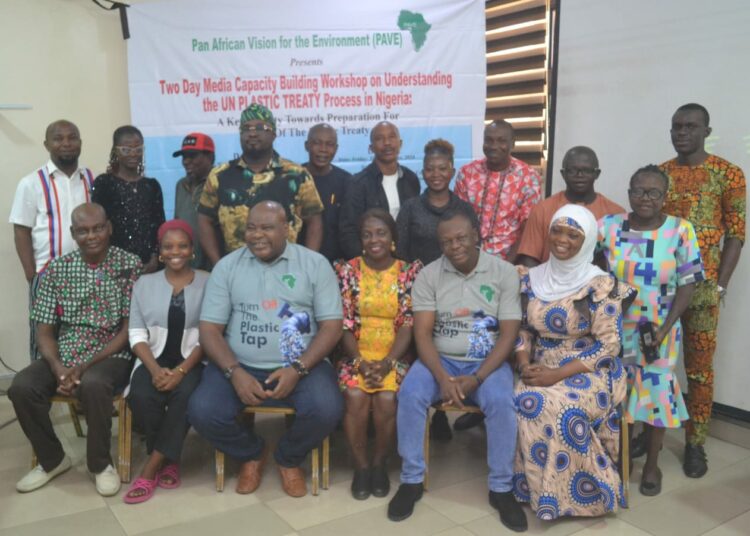Nigeria Takes Steps Towards Plastic-free Future

By VICTOR UDOH.
The Nigerian government has been urged to take immediate action to address the plastic pollution crisis in the country. This call to action was made by stakeholders at a recent media capacity building workshop in Lagos, where participants emphasized the need for a ban on single-use plastics.
The workshop, organized by the Pan African Vision for the Environment (PAVE) with the support of Global Greengrants Fund (GGF), brought together journalists, civil society organizations and government representatives to discuss the implications of the UN Plastic Treaty Process in Nigeria. PAVE is a member of the Global Alliance for Incineration Alternatives (GAIA) and Break Free From Plastics (BFFP). The event provided a platform for stakeholders to share their perspectives on the plastic pollution crisis and to identify solutions.
Anthony Akpan, Executive Director of PAVE, in a keynote address on “The Plastic Age,” highlighted the public health implications of plastic waste. He emphasized that plastic pollution is a global menace with severe health and environmental implications. He also expressed concern over Africa’s emerging role as a recipient of plastic pollution from the Global North, with dire consequences.
Akpan called for an inclusive approach to managing plastics in Nigeria, entailing collaboration among stakeholders, including community, religious and political leaders.
His words: “Plastic is toxic: it contains 16,000 different chemicals, a quarter of which is hazardous to human and environmental health. It is also potentially unrecyclable – only 10% known to be recycled since 1953. Humans consume about 1.2 billion plastic bottles every minute, with nearly half of global plastic production used for single-use items. Mind you, this plastic leakage is expected to double to 44 million tonnes a year due to buildup of plastic in aquatic environment and triple by 2060.
“So, what are we saying; plastic pollution is a ticking time bomb that threatens the health and well-being of Nigerians. We need to take action now to reduce plastic waste and promote sustainable practices, and as we can’t recycle ourselves out of plastic pollution crisis; the best way is to stop production of plastics.”
Victor Fabunmi, Senior Programme Officer at Sustainable Research and Action for Environmental Development (SRADev Nigeria), presented on “Emerging Plastic Bans in Africa and Nigeria.” Fabunmi emphasized the need for authorities to enforce bans or restrictions on single-use plastics such as styrofoam, microbeads and carrier bags. He also canvassed the introduction of Extended Producer Responsibility (EPR) programmes, and the implementation of tax incentives or subsidies for industries adopting eco-friendly alternatives.
Philip Jakpor, Executive Director of Renevlyn Development Initiative (RDI), in his presentation agreed with PAVE that recycling is not an ample solution. Tackling newsmen, Jakpor advised them to give attention to wholesome reportage, where their stories carry human face, predict and amplify solutions as well. “If criticizing a model, get expert information, ensure it is constructive, pro-active, references connection of man with his environment, and provides solutions to problems.”
The event also saw the launch of the Africa Zero Waste Journalist Network, Nigeria chapter, which aims to galvanize journalists to create awareness on climate change, zero waste, plastics and electric vehicle batteries.
As Nigeria takes steps towards a plastic-free future, the government, civil society organizations, and individuals must work together to address the plastic pollution crisis. The recent workshop in Lagos was a step in the right direction, and it is hoped that it will inspire further action to protect the environment and promote sustainable practices.



